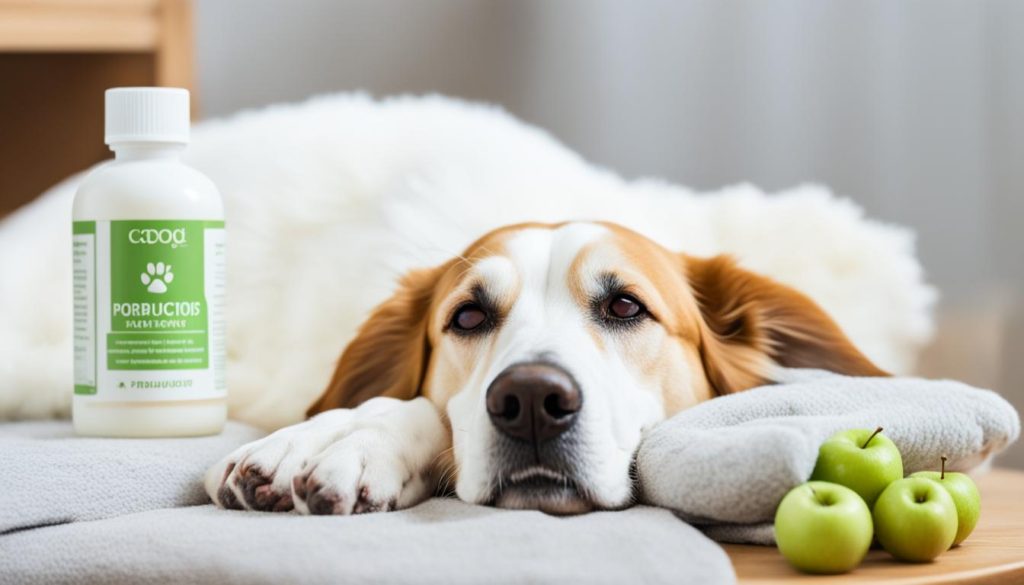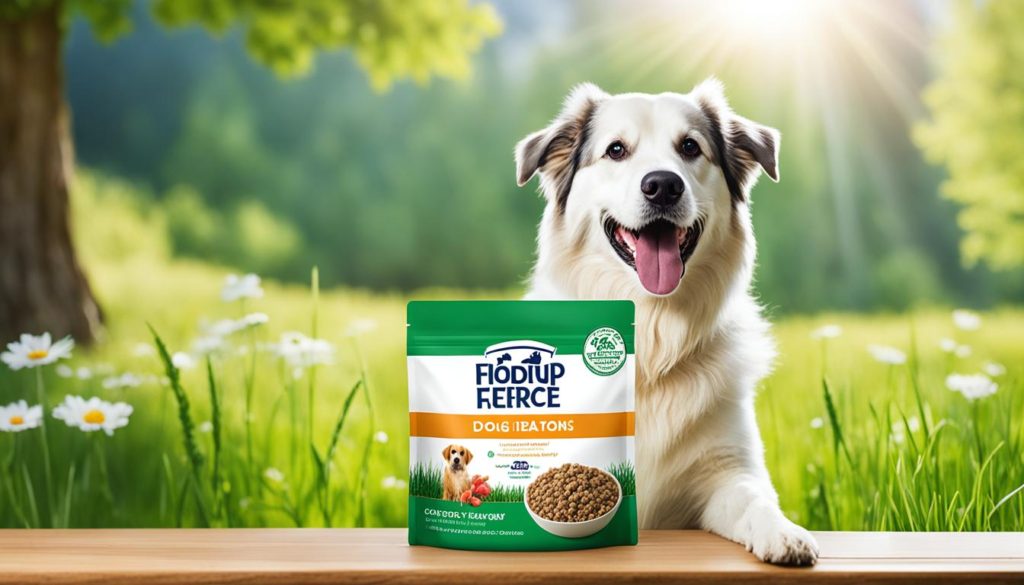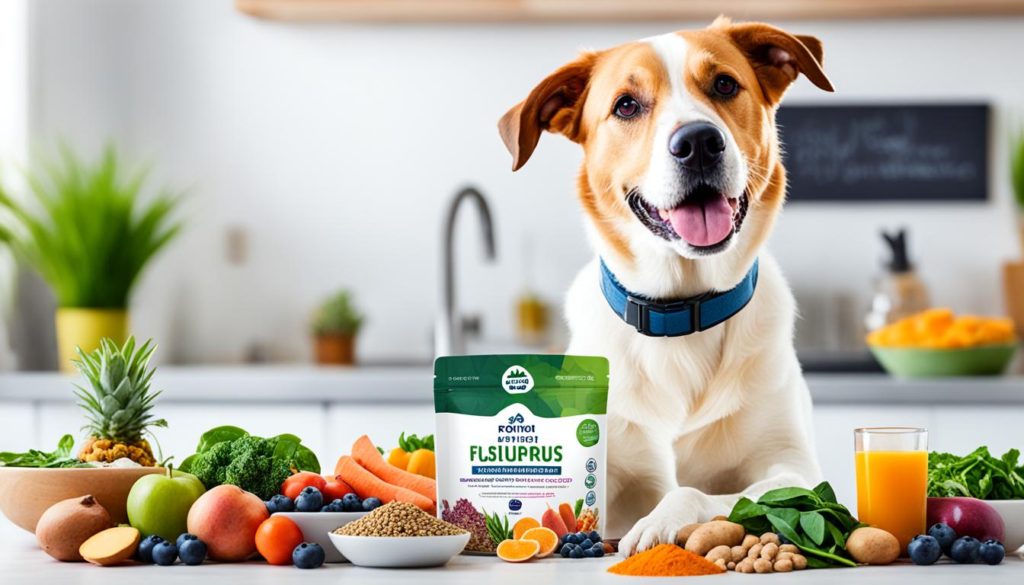If your dog is suffering from allergies and yeast infections, it can be a distressing and uncomfortable experience for them. These conditions can cause a range of symptoms, from persistent scratching and red, irritated skin to hair loss and a musty odor. Fortunately, there are steps you can take to help manage and prevent these conditions, including choosing the right diet for your furry friend.
Key Takeaways:
- Yeast infections in dogs can cause discomfort and other health issues if left untreated.
- Factors such as moisture, humidity, skin folds, and atopy can contribute to yeast infections in dogs.
- Treating yeast infections involves regular cleaning, grooming, and using antifungal treatments.
- The best dog food choices for yeast infections are hypoallergenic, limited ingredient, and grain-free.
- Preventive measures include reducing exposure to fungal spores and incorporating probiotics into your dog’s diet.
What Causes Yeast Infections in Dogs?
Yeast infections in dogs can be caused by various factors. Understanding these causes can help you take preventive measures to protect your furry friend from this uncomfortable condition.
- Moisture and Humidity: Dogs are more susceptible to yeast infections during warmer months due to increased moisture and humidity. These conditions create an environment that promotes yeast growth.
- Skin Folds and Wrinkles: Breeds with skin folds and wrinkles, such as Bulldogs or Shar-Peis, are particularly prone to yeast infections. Moisture tends to accumulate in these areas, creating an ideal breeding ground for yeast.
- Atopy: Dogs with atopy, a condition characterized by excessive itchiness caused by environmental allergens, are more susceptible to yeast infections. The constant scratching weakens the skin barrier and makes it easier for yeast to establish an infection.
- Water Exposure: Dogs who frequently come into contact with water, especially non-chlorinated water like ponds or lakes, have an increased risk of developing yeast infections. Floppy ears that dip into water while drinking can also contribute to ear infections.
To reduce your dog’s exposure to these factors and minimize the risk of yeast infections, it’s important to keep their skin clean and dry, especially in areas with folds or wrinkles. Regular grooming and drying after water activities can help maintain a healthy environment for their skin. Additionally, managing your dog’s allergies and avoiding non-chlorinated water sources can further prevent yeast infections.
How are Yeast Infections Treated?
Yeast infections in dogs can cause discomfort and other health issues if left untreated. Prompt treatment is vital to ensure your dog’s well-being. Here are some essential steps to effectively treat yeast infections:
- Cleaning and Grooming: Regular cleaning and grooming are crucial for preventing yeast infections in dogs. Pay extra attention to areas prone to moisture, such as skin folds and wrinkles. Use a gentle, hypoallergenic shampoo to cleanse your dog’s skin and coat.
- Ear Flushing: Flushing your dog’s ears is crucial, particularly if they have been exposed to water. Moisture trapped in the ear canal can lead to ear infections and contribute to yeast overgrowth. Consult with your veterinarian to determine the appropriate ear cleaning solution and technique.
- Veterinary Consultation: It’s essential to consult with a veterinarian or veterinary dermatologist for an accurate diagnosis and treatment plan. They will assess your dog’s condition and recommend the most suitable course of action. Your veterinarian may perform skin scrapings or take other diagnostic tests to confirm the presence of yeast infections.
- Antifungal Treatments: Depending on the severity of the infection, your veterinarian may prescribe antifungal shampoos, creams, or sprays for topical treatment. These products help eliminate yeast overgrowth on the skin. In more severe cases, oral antifungal medications may be necessary to eradicate the infection from within.
Following the treatment plan prescribed by your veterinarian is essential for effectively managing yeast infections. Consistency and good hygiene practices, such as keeping your dog’s living environment clean and dry, will help prevent future recurrences. Regular check-ups with your veterinarian will ensure that the treatment is progressing well and any necessary adjustments can be made. Your veterinarian is your best resource for expert advice on how to treat and prevent yeast infections in dogs.

The Best Food Choices for Dogs with Yeast Infections
Feeding your dog the right diet is an effective way to prevent and manage yeast infections. When it comes to dogs with yeast infections, the best dog food choices are those that prioritize hypoallergenic, limited ingredient, and grain-free options. These selections aim to eliminate common allergens, reduce the risk of food sensitivities, and eliminate potential sources of carbohydrates that can fuel yeast growth.
One popular option for dogs with yeast infections is hypoallergenic dog food. This type of food avoids common allergens that can trigger yeast infections, such as beef, chicken, dairy, and wheat. By eliminating these potential triggers, hypoallergenic dog food helps to prevent yeast overgrowth and maintain your dog’s overall health.
Another recommended choice is limited ingredient dog food. This type of food contains a reduced number of ingredients to minimize the risk of food sensitivities that can contribute to yeast infections. Limited ingredient dog food simplifies your dog’s diet, making it easier to identify and avoid potential allergens.
Grain-free dog food is also beneficial for dogs with yeast infections. By eliminating grains like wheat, corn, and soy, grain-free dog food removes potential sources of carbohydrates that can fuel yeast growth. Instead, these foods often include alternative sources of carbohydrates, such as sweet potatoes or peas, which are less likely to contribute to yeast overgrowth.
Choosing dog food made with natural, high-quality ingredients is essential for managing yeast infections. Foods with natural ingredients provide essential nutrients and support your dog’s overall health and immune system.
Here are some recommended options for dog food choices that are beneficial for dogs with yeast infections:
- Dehydrated grain-free fish
- Dehydrated limited ingredient duck
- Dehydrated limited ingredient fish
- Functional pour overs with skin and coat support
- Instant goat’s milk with probiotics
These choices offer a range of options that are free from common allergens, minimize the risk of sensitivities, and provide natural, high-quality ingredients. Always consult with your veterinarian before making any significant changes to your dog’s diet.

Remember, choosing the right food for your dog is just one aspect of managing yeast infections. It’s important to follow a comprehensive approach, including regular cleaning, grooming, and veterinary consultation. With the right diet and care, you can help your dog maintain optimal health and manage yeast infections effectively.
How to Prevent Recurring Yeast Infections
To prevent recurring yeast infections in dogs, it is important to take proactive measures that reduce their exposure to fungal spores. This can be achieved through regular and thorough cleaning, as well as adjustments to their diet.
Cleaning and Removing Fabric Surfaces: Fabric surfaces in your home can harbor fungal spores, which can contribute to yeast infections in dogs. To reduce the risk, make sure to clean and remove any fabrics that your dog frequently comes into contact with, such as bedding, blankets, and rugs. Launder them regularly using hot water and a pet-safe detergent to eliminate any potential spores.
Adjusting Diet: A dog’s diet plays a crucial role in preventing yeast infections, especially if they have food allergies. Consider switching your dog to a novel animal protein diet that incorporates ingredients they haven’t been exposed to before. This can help reduce the risk of allergic reactions that can lead to yeast overgrowth. Additionally, opt for dog food that is specifically formulated to support a healthy immune system and promote gut health, as a strong immune system can help prevent yeast infections.
Using Probiotics and Prebiotics: Probiotics and prebiotics are beneficial for dogs with yeast infections as they support healthy digestion and the growth of beneficial gut bacteria. Including probiotics and prebiotics in your dog’s diet can help maintain a balanced gut flora, which can contribute to a stronger immune system and prevent yeast overgrowth. Consult with your veterinarian to determine the appropriate probiotic and prebiotic supplements for your dog.
Tip: Regular cleaning and adjusting your dog’s diet can help prevent recurring yeast infections, but it’s important to consult with a veterinarian for personalized advice and guidance.
Preventive Measures to Break the Cycle of Recurring Yeast Infections:
- Clean and remove fabric surfaces that may harbor fungal spores.
- Adjust your dog’s diet to include a novel animal protein diet and probiotics/prebiotics.
- Consult with a veterinarian for personalized advice and guidance.
Taking these preventive measures can help break the cycle of recurring yeast infections in dogs and ensure their overall health and well-being.
The Benefits of a Raw Diet for Dogs with Yeast Infections
Switching your dog to a raw diet can have significant benefits for dogs with yeast infections. A raw diet mimics the natural diet of dogs in the wild and provides richer nutrients and enzymes that boost the immune system. A raw diet eliminates excess carbohydrates that can fuel yeast growth and avoids fillers and preservatives found in many commercial dog foods. A well-formulated raw diet limits carbohydrate intake, provides essential vitamins and minerals naturally, and creates an environment less hospitable to yeast. Switching to a raw diet can not only treat current yeast infections but also prevent future outbreaks by supporting the overall health and wellness of your dog.
Benefits of a raw diet for dogs with yeast infections include:
- Nutrients and Enzymes: Raw diets are rich in nutrients and enzymes that can boost your dog’s immune system. These natural components support the body’s ability to fend off yeast overgrowth.
- Grain-Free and Preservative-Free: Raw diets eliminate common sources of carbohydrates, such as grains, which can fuel yeast growth. They also avoid fillers and preservatives found in many commercial dog foods that may contribute to yeast infections.
- Supports the Immune System: A raw diet provides essential vitamins, minerals, and antioxidants that support a strong immune system. A robust immune system can help prevent and fight off yeast infections.
“Switching to a raw diet can not only treat current yeast infections but also prevent future outbreaks by supporting the overall health and wellness of your dog.”
Example Raw Diet for Dogs with Yeast Infections
| Meal | Benefits |
|---|---|
| Dehydrated Grain-Free Fish | High in omega-3 fatty acids, which help reduce inflammation and support healthy skin and coat. |
| Dehydrated Limited Ingredient Duck | A novel protein source that reduces the risk of food sensitivities and supports a healthy immune system. |
| Dehydrated Limited Ingredient Fish | Packed with essential nutrients and easily digestible, promoting overall health and wellness. |
| Functional Pour Overs with Skin and Coat Support | Contains ingredients like salmon oil and coconut oil, which nourish the skin and coat and support a healthy immune system. |
| Instant Goat’s Milk with Probiotics | Provides probiotics for healthy gut flora and overall digestive health. |
By incorporating these raw diet options into your dog’s meals, you can help reduce yeast overgrowth and promote a healthier immune system. However, it’s important to consult with your veterinarian before making any significant changes to your dog’s diet.
Top 10 Nutritious Dog Food Options for Yeast Infections
When it comes to choosing the best dog food for dogs with yeast infections, there are several nutritious options available. These dog foods are formulated with high-quality ingredients and are suitable for dogs with allergies and yeast infections.
1. Instinct Freeze Dried Raw Meals
Instinct Freeze Dried Raw Meals provide a convenient and nutrient-rich option for dogs with yeast infections. This grain-free dog food is packed with raw, natural ingredients that support your dog’s overall health and well-being.
2. ZIWI Peak Air-Dried Dog Food
ZIWI Peak Air-Dried Dog Food is a premium air-dried dog food that is made with single-sourced meat and organs. It is grain-free and packed with essential nutrients to support your dog’s immune system and digestive health.
3. Primal Freeze-Dried Dog Food Nuggets
Primal Freeze-Dried Dog Food Nuggets are formulated with organic ingredients and are a great option for dogs with yeast infections. This raw dog food is packed with essential vitamins and minerals to support your dog’s overall health.
4. Halo Freeze Dried Raw Beef Meal Bites
Halo Freeze Dried Raw Beef Meal Bites are made with real, whole meat and are a great option for dogs with yeast infections. This grain-free dog food is rich in protein and free from artificial additives and preservatives.
5. Zignature Zssential Multi-Protein Formula Grain-Free
Zignature Zssential Multi-Protein Formula Grain-Free dog food is made with high-quality proteins like turkey, duck, and salmon. This limited ingredient dog food is grain-free and suitable for dogs with allergies and yeast infections.
6. Nature’s Recipe Grain-Free Salmon, Sweet Potato & Pumpkin Recipe Dry Dog Food
Nature’s Recipe Grain-Free Salmon, Sweet Potato & Pumpkin Recipe Dry Dog Food is made with real salmon as the main ingredient. This grain-free dog food is rich in omega-3 fatty acids and supports healthy skin and a shiny coat.
7. Rachael Ray Nutrish Natural Chicken & Veggies Recipe Dry Dog Food
Rachael Ray Nutrish Natural Chicken & Veggies Recipe Dry Dog Food is made with real chicken and wholesome veggies. This natural dog food is free from artificial flavors and preservatives, making it a healthy option for dogs with yeast infections.
8. Instinct By Nature’s Variety Limited Ingredient Diet Grain-Free Recipe
Instinct By Nature’s Variety Limited Ingredient Diet Grain-Free Recipe is specifically formulated for dogs with allergies and sensitivities. This grain-free dog food is made with a limited number of ingredients to minimize potential allergens.
9. The Honest Kitchen Grain-Free Turkey Recipe Dehydrated Dog Food
The Honest Kitchen Grain-Free Turkey Recipe Dehydrated Dog Food is a dehydrated dog food that is made with real, human-grade ingredients. This grain-free dog food is packed with essential nutrients and is suitable for dogs with yeast infections.
Discover Your Dog’s Perfect Diet
The right dog food can make a significant difference in managing yeast infections in dogs. Consult with your veterinarian to determine the best dog food option for your furry friend’s specific needs.
Conclusion
When it comes to managing yeast infections in dogs, taking preventive measures and providing a healthy diet are key. Opting for the best dog food for allergies and yeast infections, such as hypoallergenic, limited ingredient, and grain-free options, can play a vital role in preventing and managing yeast overgrowth. Regular cleaning and grooming, along with ear flushing, should be part of your dog’s hygiene routine to effectively treat yeast infections. Consulting with a veterinarian is crucial to ensure accurate diagnosis and appropriate treatment.
A raw diet can offer numerous benefits for dogs with yeast infections. Not only does it support the immune system, but it also helps reduce carbohydrate intake, which can contribute to yeast growth. By choosing a raw diet, you can provide your dog with natural and nutritious ingredients, avoiding fillers and preservatives often found in commercial dog foods.
There are plenty of nutritious dog food options available, specifically designed for dogs with yeast infections. With brands like Instinct, ZIWI Peak, Primal, Halo, Zignature, Nature’s Recipe, Rachael Ray Nutrish, and The Honest Kitchen, you can find high-quality dog foods that meet your dog’s dietary needs and help manage yeast infections. By making informed choices and implementing preventive measures, you can ensure your dog’s overall well-being while effectively managing and preventing yeast infections.
FAQ
What are the best dog food options for allergies and yeast infections?
The best dog food choices for dogs with allergies and yeast infections are those that are hypoallergenic, limited ingredient, and grain-free. They should also be made with natural, high-quality ingredients.
What causes yeast infections in dogs?
Yeast infections in dogs can be caused by factors such as moisture and humidity, skin folds and wrinkles, atopy (excessive itchiness), and water exposure.
How are yeast infections in dogs treated?
Yeast infections in dogs are treated through regular cleaning and grooming, ear flushing, veterinary consultation, and the use of antifungal treatments.
What is the best way to prevent recurring yeast infections in dogs?
Preventing recurring yeast infections in dogs involves reducing their exposure to fungal spores, cleaning and removing fabric surfaces, adjusting their diet, and including probiotics and prebiotics.
What are the benefits of a raw diet for dogs with yeast infections?
A raw diet can have significant benefits for dogs with yeast infections, including supporting the immune system, reducing carbohydrate intake, and avoiding fillers and preservatives found in many commercial dog foods.
What are some of the top nutritious dog food options for dogs with yeast infections?
Some top dog food options for yeast infections include Instinct Freeze Dried Raw Meals, ZIWI Peak Air-Dried Dog Food, Primal Freeze-Dried Dog Food Nuggets, Halo Freeze Dried Raw Beef Meal Bites, Zignature Zssential Multi-Protein Formula Grain-Free, Nature’s Recipe Grain-Free Salmon, Sweet Potato & Pumpkin Recipe Dry Dog Food, Rachael Ray Nutrish Natural Chicken & Veggies Recipe Dry Dog Food, Instinct By Nature’s Variety Limited Ingredient Diet Grain-Free Recipe, and The Honest Kitchen Grain-Free Turkey Recipe Dehydrated Dog Food.
